The Road to CukoRakko: A Conversation With Col. Bruce Hampton September 25, 2015 09:19
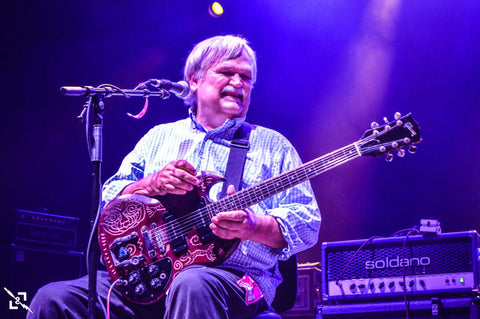
Interview and Photos by Jordan Kirkland: Live & Listen
Earlier this week, we had a chance to sit down with the godfather of jam rock, Col. Bruce Hampton. Born as Gustav Valentine Bergland III in Oak Ridge, Tennessee, on April 30, 1947, Bruce was given the nickname “colonel” at a young age. The colonel’s music knows no boundaries, which falls in line with his quirky, intelligent, zen-like personality. We are excited to work with our friends at CukoRakko Music & Arts Festival, held at Horse Pens 40 in Steele, Alabama next weekend (Oct 2nd – October 4th). Hampton’s latest project, The Madrid Express, is set to play CukoRakko w/ special guest Carter Herring at 4:00 PM on Sunday, October 4th.
Click Here: Purchase Tickets to CukoRakko Music & Arts Festival
You've been at it in this music scene since the 60's, dating back to the days with the Hampton Grease Band. What are some of your earliest memories from learning to play the guitar? Can you share any good stories from some of your earliest gigs?
Col. Bruce: Well I think it was either the 2nd or 3rd gig, we were playing a frat party at the University of Georgia. I certainly had no idea what I was doing. I was 16-years-old. I wanted to go learn and see what the world was like and learn everything about it. We opened at about 4:00 PM. There were about five bands that night. The headliner came on at about 9:00 PM and his name was Otis Redding, and I said "Oh, that’s how it's done." I got to see just about everybody I wanted to see growing up. I was very, very, very lucky. I mean, I got to see the blues masters, Bukka White, Son House, Freddie King, Albert King, Miles (Davis) back in the 60's, and just about everybody I wanted to see. I was very lucky. And certainly every Rock act; just about everybody.
I was really fortunate. And I feel so sorry for your generation. You guys just don't get to see the quality that was there at one time. The tonality, the intent, and the desperation of urgency...you know, it was just another world back then. People played music for the cause. You had to do it, you know? It's not something you chose you do. You had to. I say that's my number one thing of intent: you either play for the cause, or you don't. Either money comes your way, or it doesn't, or fame or whatever you think will make you happy. But you continue doing it. I don't know what the cause is, but I know you should play for it.
Just like you're doing...you're playing for the cause. You're intent isn't to be famous or rich, but if it comes your way...great. You're doing it, and I'm telling you man...the world needs music, and it's in a poor spot right now. It's the worst that I've ever seen it. It's almost like a soft drink commercial. There's still great stuff out there, but it's a little scary, you know? Especially country music, where there was such soulfulness from about 1955 to 1975. Now it just sounds like 80's Vegas Rock, you know? It's a shame. And I love the real country music, but it's all the same to me. It's either pure or it's not. The great music of the 50's and 60's...it holds up with Muddy Watters, B.B. King, Howlin' Wolf, jazz, or whatever. It's all the same, as long as it's from the heart and pure.
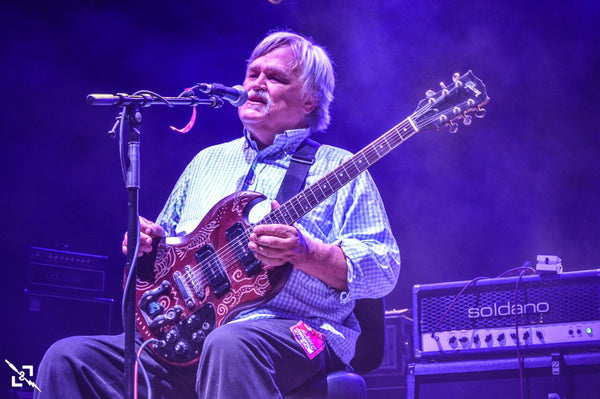
Photo by Live & Listen
Who were some of your earliest musical inspirations? Can you point to anyone in particular who truly drove you towards being a full time musician?
Col. Bruce: Oh my god...I could go for 300 pages. When I was about 9-years-old, I told people I wanted to be Little Richard, and I failed miserably. I still think he is the greatest rock-and-roll singer that ever lived. Just hearing that great music of Chuck Berry, Fats Domino, Jerry Lee Lewis...I mean rock-and-roll, begat the 50's, you know the 50's were about the most boring decade there ever was. Everything was just boring, and then all of the sudden, that music, rock-and-roll, was like an atomic bomb. It sort of changed the world; the way people thought and everything.
I like all of the real blues guys: Fred McDonald, Son House, Bukka White, and on and on and on. The electric blue guys, all of the Kings: Albert, Freddie, and B.B. Two or three hundred jazz guys, from Count Casie to 'Trane (John Coltrane) to Monk (Thelonious Monk) to Miles (Davis), on and on and on. And classical...Stravinsky and a composer named Krzysztof Penderecki. Those are my two favorites in that field. I like Latin too. I like it all...as long as it's pure...and doesn't have much cheese in it. That’s my enemy, cheese.
I'm sure you've answered this a million times, but I've always wanted to ask. What's the real story behind you becoming "The Colonel?"
Col Bruce: (laughs) I've never been asked that! Sixteen times an hour! There's a nine hour version and then there's a 47 hour version. Let me say real quickly. That is my real name. I am a real Colonel. I'm not a part of any military anymore, and I want to spell it "k-e-r-n-e-l." But I went to military school and I become a colonel. But I came from a long line of military officers, and I was the first male child not to follow in their footsteps to West Point. My grandfather and uncle starting calling me "Colonel" at a young age. It's a personal and professional nickname, like "Duke Ellingston" or Sargeant Slaughter." The entire story is too long to explain; therefore it's basically a moniker. Let me say that and I'll avoid trouble. I did do some stuff, you know. And I want to spell it "k-e-r-n-e-l."
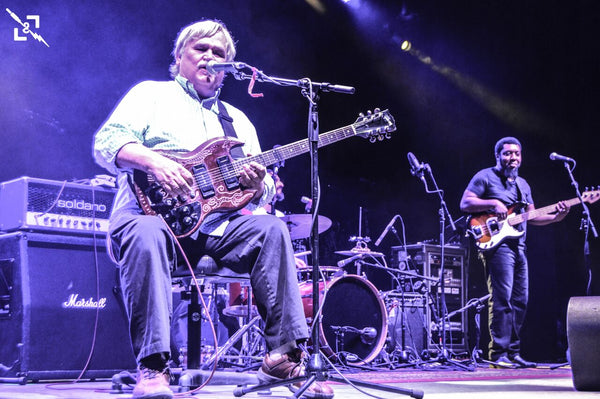
Photo by Live & Listen
We can certainly try to help you get the word out on that.
Col. Bruce: (laughs) It's just funny. I get asked that a lot. That and, "Where did Aquarium Rescue Unit come from?" Those two questions seem to be leading the way. I'll answer the Aquarium Rescue Unit question too. It was a job I had; to rescue aquariums in the middle of the night. I was a young man. They would break, and we would go rescue them. It was very hard and very nerve-racking. We'd have a ten foot aquarium, and they were cracking. We'd repair them. I'm glad I did it while I was young!
You were a key figure in the formation of the H.O.R.D.E tours during the early 90s. How did you become involved and what stands out the most when looking back on that experience?
Col. Bruce: It was in the early 90's, and we were touring up North a lot with Phish and Blues Traveler. No one was really drawing anybody, and they came up to me and said, "You're the old guy. What was it like in the 60's?" And I said, "Well, we all got together and did big group gigs, because they would draw 1,000 people, instead of 100." And Phish really was starting to have a great thing, along with John Popper, John Bell. I was certainly not a major player, by any such. It just sort of took on a life of itself. We tried out the whole deal and only charged $10 a ticket.
We had Dave Matthews Band, Phish, Widespread...I can't even remember everybody. By the end of it, I bet we had over 150 people that played it. We tried to put it back together again, but its impossible now for many reasons. It was amazing. You got to see six bands for 10 bucks. Nobody really knew who anybody was. I guess Dave Matthews was the first to really become known, in probably 1993 or so. You could go see all six of those bands for 10 bucks. That was hard to beat. And it was sort of new generation coming then, you know?
We tried to do like the old Motown tours. Back in the day, they'd have eight acts in four hours. Stevie Wonder would to 20 minutes, Marvin Gaye would do 20 minutes, and it was amazing. But that was sort of what it was based on. There were things called "revue," like the James Brown Revue. He'd have six opening acts. They would come out and play four tunes. Those things just aren't there anymore. Sometimes, you have an opening act. The great thing about those things was that everybody was a quality group, you know? The opening act would be Albert King or somebody of that nature, just incredible quality. I'd love to see that again. It's hard to find quality in anything.
I hate that I missed out on the H.O.R.D.E. tours. Being 28-years-old, I was just a little too young to be a part of that era.
Col. Bruce: Right...yeah you were 8-years-old. No, you were three! Good god, was that 25 years ago or what? Jesus Christ! That hurts. Damn I'm old! You've just made me feel 300-years-old. No, I'm glad to be here. It's better than the alternative...that's for sure.
You're fresh off of the big Aquarium Rescue Reunion Tour, which brought about 14 shows for the band, spanning from Denver down to Alabama and Georgia and up to Brooklyn. How did this tour ultimately come together, and do you see it as something that could happen more often when the schedules allow?
Col. Bruce: I think we're going to try to do it again next summer. There is talk about teaming up with John McLaughlin and doing a co-bill. Our manager, Souvik Dutta, really put it all together. He has a lot of great musicians in his fold. He's a manager for many. I give him most of the credit. What's funny is that I thought that was a pretty hard tour, and then that day I went to Mobile, Alabama for 5 weeks in 100 degree weather and filmed a movie for 16 hours a day, which is just insane. Thankfully, my friend William Barnes saved my life down there! So, I finally got home. I'm starting to get a little rest. It was a really great, busy summer. I think I left on June 29th and got home a week ago.
Any details you can share on the movie?
Col. Bruce: Yeah, it's called Here Comes Rusty, and I think it'll be out in April on 2016. I think there is a trailer out on it now. I play a drunken, volatile dog track owner. We've got some great people in the cast, like Fred Willard, who's probably my favorite actor of all time. Mrs. Jolie Adams, who was in Chasing Amy...she's unbelievable. Also, a guy named Pauly Litt, who was huge about 15-years-ago. He was with Regis and Cathy Lee and was on her show. He's making a comeback. He's 20-years-old, and he's making a comeback. It looks good man, but you can't ever tell by the edits. We've got our fingers crossed, you know? I can't wait to see it. It's either gonna be really good, or it' gonna be good.
Watch the official trailer for 'Here Comes Rusty' here:
I've heard a lot about ARU's "freestyle" approach to each live show. How much true rehearsing goes on behind the scenes? Does each set list evolve as the show progresses?
Col. Bruce: Wow! We had our first rehearsal ever, in 30 years, about four months ago. We had never had one. Right before we went on, we just ran through all of the tunes, because everybody had forgotten them. So that was our first rehearsal ever, dating back to 1988. The setlist...I can't even remember man. It was such a whirl wind. Then I went right to the movie in Mobile, and my brain is just fried. I can't remember a thing from the whole tour. We were moving so fast, and we weren't an active group, so everything is new every day, you know? Everything logistically...you don't really know what to do. So is this going to work...not musically...but from point a to point b? The logistics of it all. It sure was fun, and it was pretty hard on everybody, I think. Especially, Jeff...he plays drums like he's possessed, and he's over 50. I know he and I were probably the two that hurt the most. We're in the "formula grey club." Is that called Grecian Formula or something? Yeah, yeah I think it is.
You have been a major influence on the band Widespread Panic. I know it's been special to watch those guys evolve as musicians and as a collective band. You're now seeing Jimmy Herring's son, Carter, come into his own, often next to you on stage. How special has that experience been?
Col. Bruce: I've known Carter since he was a kid, and he's playing with us for the next month. He's doing Birmingham, and he's doing CukoRakko next weekend too. I don't know many guitar players that are better than Carter. He's only 20-years-old, and he's unbelievable. Seriously...he's as good as anybody, man. He is really somethin'. And I really like his playing. But yeah, now the grandkids are coming soon (laughs). I knew Duane Trucks since he was one year old. We used to have him play with us on stage when he was four years old. So it's really amazing man. Carter, especially, such a nice fella, and so is Duane. Carter's gonna be the salt of the earth pretty soon. He already is. He can play...that's for sure.
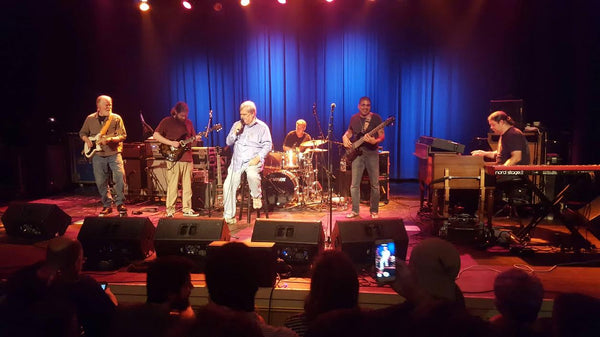
Photo by Live & Listen
It's amazing to see the collective family that seems to have started with the Allman Brothers and now seems to revolve around Widespread Panic.
Col. Bruce: They're as good of people as there are, man. I would not be working the last twenty years if it wasn't for them. I wouldn't have been working. They have been dear friends since '82. Great organization of folks, man. Hopefully they keep going. It's unbelievable what they have done for everybody. And they do nothing but great things for the community. They donate instruments to the children of Georgia. They do benefits all of the time. They really aren't recognized for it. They do so many positive things, and they're just great people.
Your latest project, The Madrid Express, is set to headline CukoRakko Music & Arts Festival at Horse Pens 40 in Alabama next weekend. How do you feel this group differs from your past projects? What would you tell those who haven't seen the Madrid Express to expect?
Col. Bruce: I'll let you answer (laughs). I really don't know if we are much different. Like I say, we keep an open channel, as long it's pure. Pure American music...pure from the heart. That's all I care about. I don't think we're any different. Just different players playing the same thing. I'd like to get it down to one song and just do it for two or three days, which is impossible, whether it be "20,000 Bottles of Beer on the Wall," or "Old Wisconsin" or whatever. Just take it everywhere it could possibly go, but you'd have to really be listening. We'll have two great guitarists with us, Jacob Deaton and Carter Herring. We'll have our drummer, Darren Stanley, and our great bass player named Billy Thornton, who we call Billy V. Thornton instead of Billy Bob Thornton. They've gotta be related somehow.
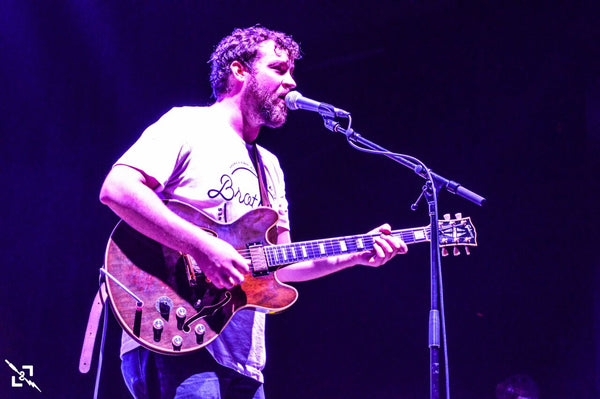
Jacob Deaton of The Madrid Express
Photo by Live & Listen
I'd feel crazy if I didn't ask you about your cameo appearance with Vic Chestnut in the movie Sling Blade. Can you tell me how that came to be? Any good stories from behind the scenes with Billy Bob?
Col. Bruce: Oh, a millon stories…that I shouldn’t tell. Nah man, that cat is like China; every 50 miles there’s a different thing going on. To me, he’s one of the greatest actors/writers of all time. He’s probably got 20 scripts that need to be out in the world, and certainly Hollywood won’t let him. He’s as talented as they get. The thing with Sling Blade, we were doing it, and it was his first movie he’d ever done, so his life was on the line, you know. I mean, there was a lot of pressure on it, so he had to do pretty good. He constantly went around the the janitors, the actors, the cooks, everybody…and made sure everybody was comfortable. You never see that on a movie set. It’s usually more like a spring football drill at the University of Alabama.
He wasn’t ever thinking of himself, and I don’t think I’ve ever seen anything quite like it. It was such a gas to work with him. He said that he wrote it for me, that it was written in my language. Also, behind the scenes, Vic (Chestnut) was supposed to have a balsa wood door, but it was still oak, and he cut his head! He was laughing about it. He was supposed to go right through the door, and they never replaced it. So everybody was laughing about it, even Vic, but (John) Ritter got mad. He got really mad. Vic was ok. He said he wasn’t hurt, but it was supposed to be balsa wood, and he was supposed to come out the other side. And there were at least 30 other amazing things that happened behind the scenes during that movie. I do not think we even did three takes on anything. It just flew, you know? Two takes at most, and Robert Duvall said that that room was about 105 degrees when he was saying he was his father. That’s just one of the greatest scenes in cinematic history, I think. That was just amazing.
The cast was just unbelievable. Dwight (Yoakam) was always unbelievable. Ritter was great, and Billy Bob…my god, that was fantastic. So I had a blast and certainly thanked him for having me in the film. He had come in ’85 to write the Otis Redding story. Phil Walden, the president of Capricorn, was his manager, and he was also my manager. There’s so much to tell about Billy Bob, but I can’t say it in print! He is the king of mythocracy.
I've heard you're a huge baseball fan. I know you're also an Atlanta resident. It's been one hell of a tough year for the Braves. What's your take on the current state of the team?
Col. Bruce: Well, I think it’s actually been great, if we look at the whole without the fragment. What they’re doing is getting ready for 2017, when they move into the new stadium, which I still think is the dumbest thing since Hitler invaded Russia in the winter. Everybody in this town in furious, man. Why you would put the stadium in the most traffic ridden neighborhood that there is? And there is no parking, no public transportation so to speak of. It just makes no sense at all. None…it makes no sense. What a waste. Turner Field is still brand new in my mind. I just don’t get it. I say tear down the stadium in two years and just build another one. Let’s build a stadium every two years! It’s the same thing with the Falcons’ stadium. I mean, it was a white elephant, but my god…a billion and a half dollars? I could live with that. People are insane! But with the organization, there’s just no reason to carry that salary around when you’re playing .500 ball. So they’re getting ready for 2017. I think they’ll do well. They’ve got the minor league built back up and some really good young pitchers coming up.
I go to one game a year. I’m always gone during the summer, so I tend to get to one game each year. I used to go to thirty, but I’d rather watch on TV. It’s such a hassle. It’s a long walk and usually really hot. I’d rather go to a Montgomery Biscuits game. I really like that place. I love minor league games, and I’d rather go to them. I’ve been to a lot: Asheville Tourists, Chattanooga Lookouts, Nashville Sounds. Those games are just great to go to.
Who’s your pick for the World Series?
Col. Bruce: Toronto against either the Cubs or the Mets. That’s what I think it’ll be. I’ve had a feeling since probably May that the Cubs are just gonna miraculously do it. It makes no sense, but I picked them back in May. They’re young, and they’re on 10 right now. So they’re doing it. I spent an afternoon at Wrigley back in July when they played the Miami Marlins when the Grateful Dead was playing. They really ran that whole thing so well. It went off with no hitch. It was amazing. And now they’re playing again in October! Oteil (Burbridge) is even in the band now. That’s hilarious. He went from the Aquarium Rescue Unit to the Grateful Dead. I’m really happy for him.
That was a truly an amazing weekend. I grew up listening to The Dead, and I’m also a big Phish fan, so getting to see Trey step into that role was really special. I’m convinced that there is not a more opinionated group of people in the world than the Dead fans. I feel like he silenced the critics.
Col. Bruce: They’re horrible man! They’re like the jazz police. Enjoy it. Fuck it. Let it go. It is what it is. They’re like the police man. Trey did such a great job. I congratulate him. He did a really great job. I mean, the Grateful Dead and Phish is not my cup of tea, but they nail what they nail. I respect the hell out of them, and they’re great at what they do. Trey got up there and he wailed ass. I’m just too old. I was from another world. All of my music is from 1937 to 1957.

